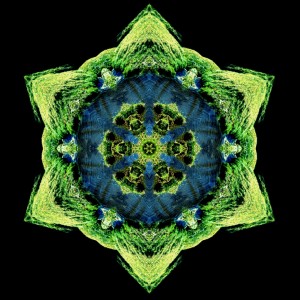 The word “Jnana” (pronounced “yah-nah”) is Sanskrit for “knowledge”. Jnana Yoga is the Yoga of Knowledge or the path of Self-inquiry. One way to practice Jnana Yoga is to continually ask yourself “Who Am I?” It is an investigation of identity, an exploration of ego, a consideration of how we think of “I”. Initially, your first few answers might sound like “I am a man”, “I am a woman”, “I am 34 years old”, “I am a Christian”, “I am a Canadian”, “I am nearsighted”, “I am blind as a bat”, “I am a carpenter”, etc. Those answers may be true, but they do not sufficiently answer the question. Material possessions, religions, nationalities, societal roles, genders and all types of labels are things that we use, act or do on the surface and certainly make everyday conversation easier. But on a more fundamental and deeper level they are not who you are. Repeating the simple question “Who Am I?” peels away layers until you eventually end at your core, your True Self. At the center of all beings is the pure light of oneness, a perfectly clear crystal, untainted by all the layers that cover it up through life. Since change is the only constant, we cannot identify our True Selves with transient objects, emotions or people. This subtle shift is expressed in a simple change in phrasing. “I work as an electrical engineer” is a less attached way to say “I am an electrical engineer”. “I practice Islam” is different than saying “I am Muslim”. “I live in Canada” is different than “I am a Canadian”.
The word “Jnana” (pronounced “yah-nah”) is Sanskrit for “knowledge”. Jnana Yoga is the Yoga of Knowledge or the path of Self-inquiry. One way to practice Jnana Yoga is to continually ask yourself “Who Am I?” It is an investigation of identity, an exploration of ego, a consideration of how we think of “I”. Initially, your first few answers might sound like “I am a man”, “I am a woman”, “I am 34 years old”, “I am a Christian”, “I am a Canadian”, “I am nearsighted”, “I am blind as a bat”, “I am a carpenter”, etc. Those answers may be true, but they do not sufficiently answer the question. Material possessions, religions, nationalities, societal roles, genders and all types of labels are things that we use, act or do on the surface and certainly make everyday conversation easier. But on a more fundamental and deeper level they are not who you are. Repeating the simple question “Who Am I?” peels away layers until you eventually end at your core, your True Self. At the center of all beings is the pure light of oneness, a perfectly clear crystal, untainted by all the layers that cover it up through life. Since change is the only constant, we cannot identify our True Selves with transient objects, emotions or people. This subtle shift is expressed in a simple change in phrasing. “I work as an electrical engineer” is a less attached way to say “I am an electrical engineer”. “I practice Islam” is different than saying “I am Muslim”. “I live in Canada” is different than “I am a Canadian”.
“Deep in the middle of the ocean of the mind there is no pollution. It is absolutely pure. That part is always contented. It never likes or dislikes. It accepts everything; it is not proud. And this is the real nature of your true Self. Only knowledge of this true nature will free you from the turmoil of this world. It will free you from the petty-mindedness which divides humanity into thousands of names: “I am this; he is that. He is different from me.” People kill each other because they group and divide themselves. They fail to see and know that they are above these differences.”
–Sri Swami Satchidananda
When applied to the eyes, we end up with Jnana Vision. We use the same question: “Who Am I?” Do you identify with your vision? Have you ever said “I am nearsighted” or “I am farsighted”? Instead, you can say “I see best up close” or “I am working on improving my distant vision”. Identifying yourself with a visual defect is accepting it as the way you are and always will be. By separating your True Self from near or farsightedness you open up the door for change. Instead of being a person with blurry vision who experiences flashes of clarity, shift your consciousness to become a person with clear vision who experiences periods of blur. This is a subtle shift, but it can yield very powerful results.

